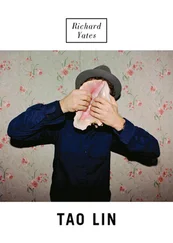Paul didn’t notice his uncle had turned around in his seat, and was grinning slightly, until he heard him say “you’re getting out here also” in Mandarin. The car was parked on the side of a street and Paul’s uncle’s girlfriend had gotten out. Paul’s uncle, who spoke English fluently, congratulated Erin then carefully said two sentences to her and maybe Paul, who was remembering how he’d been surprised — and complicatedly moved — once when his uncle talked about buying and liking Michael Jackson’s music, in this car, after asking if Paul, who doesn’t remember what he answered, or how old he’d been, maybe 10 or 11, liked Michael Jackson.
At the airport, after a silent taxi ride, around 7:30 a.m., Paul’s mother stood with Paul and Erin in line to check in luggage. Paul peripherally noticed his mother facing away, a little, with only her neck slightly turned. He looked at her and she turned her neck farther, so that he was looking at her looking elsewhere, then she turned, openly crying, toward him and said in a child-like but controlled voice that she was leaving before she started crying harder. She reflexively opened her mouth in a similar manner as when Paul had “caught” her, last year, putting sugar in her coffee, but the effect now was of further embarrassment, past helplessness, to disengagement, then withdrawal.
Paul, whose eyes had become instantly watery, hadn’t seen her like this before. He thought of her mother, who had died before Paul was born — and was aware, with momentary clarity, which did not elucidate or console, but seemed to pointlessly reiterate, of how, in the entrance-less caves of themselves, everyone was already, always orphaned — and they briefly hugged and she hugged Erin and uncharacteristically left.
Paul was in Bobst Library’s first basement floor, seated at a computer, becoming increasingly, “neurotically,” he knew, fixated on his aversion toward Erin’s red backpack, on the possibility that she would have it with her when he went upstairs, in fifteen minutes, to meet her and that, in its presence, he would feel upset. He hadn’t seen her in three weeks, since a few days after returning from Taiwan, when she returned to Baltimore, where a drunk driver had repeatedly rammed her mother’s car, breaking her mother’s hip and badly injuring Erin’s face, which the hospital had said would heal, without scarring, in four months. Erin was wearing large, black-rimmed glasses — to block her face, she said, and they hugged.
“Sorry,” said Erin with a blank expression.
“About what?” said Paul, aware he’d felt only self-conscious when he noticed the red backpack, in his vision like a dot on a screen during an optometrist’s exam.
“Face,” said Erin. “My face.”
“You look good, don’t worry.”
They walked holding hands toward Union Square, ten blocks north. Paul sometimes looked away, so Erin wouldn’t see his depressed expression. He’d begun to worry, some days, for hours at a time, that he was permanently losing interest in Erin, despite earnestly wanting, he felt, the opposite, if that were possible. “You have the red backpack,” he said grinning slightly, with some confusion.
“I do,” said Erin in a tired voice.
Paul sustained his grin tensely.
“What do you feel about that?”
“I don’t know,” said Paul looking away.
“I know you don’t like it.”
“It’s. . just,” said Paul.
“I’ll buy a new one tomorrow.”
“No,” said Paul quietly.
“I have a gift card.”
“I thought your mom was buying you one for Christmas.”
“So did I,” said Erin.
On his mattress, on their sides, holding Erin from behind, Paul thought he wouldn’t end the relationship now, or at any time while Erin’s face, which after two and a half weeks looked like it had been recently stung by eight to twelve bees, was still healing, even if he knew he wanted to, which he didn’t.
But he wouldn’t not end the relationship now, if he knew he wanted to, because it would be pitying and misleading, which Erin wouldn’t want, based on what he knew, but maybe she wouldn’t care, if she didn’t know, which she wouldn’t. Paul thought that he would stop thinking about himself and focus on Erin, but instead, almost reflexively, as a method of therapy, began thinking about suicide, then became aware of himself, a few minutes later, earnestly considering — or maybe only imagining — trying to convince Erin that they should commit suicide together. After an initial, default “open-mindedness” they could easily become fixated, then would want to do it quickly, while it made sense. They would find information on the internet and hurry to a subway station, or wherever, collaborating intimately again, looking out at the world from a new and shared perspective. Paul began to feel, in a way he hadn’t before, like he comprehended double suicide — the free and mysterious activity of it, like a roller coaster descending only into darkness, but accessible from anywhere, on the theme park of Earth, always open.
He sensed his vicinity to a worldview — or a temporary configuration of preferences, two or three ideas introduced to a mood — in which double suicide would be as difficult, as illogical, to resist as a new sushi restaurant to a couple that likes sushi and trying new restaurants. He felt scared, and to distance himself from what he might accidentally engage in, or be absorbed by, in a moment of inattention or daydreaming, he opened his eyes and leveraged himself and looked over Erin’s shoulder with an extremely troubled expression. To his surprise — and self-consciously private confusion, relocated immediately away from the front of the face, to study later — she looked serene and was smiling a little, it seemed.
• • •
Three weeks later they were seated in Sunshine Cinema — at a showing of Somewhere that would begin in five minutes — and had ingested Xanax, which hadn’t taken effect, when Paul, staring at the screen, said in a monotone that he wanted to talk about their relationship. Immediately, in a sort of rush, which indicated to Paul that she wished she had said it first, an otherwise unfazed Erin said she also wanted to talk about their relationship. Paul said he felt bad about it, but didn’t know what to do, or what else to say. Erin said she felt the same. They talked, staring at the screen, during previews — mostly reiterating that they felt bad, didn’t know what to do, didn’t know what else to say — and stopped, when the movie began, without resolution.
At some point, the past two or three weeks, Paul had begun to imaginarily hear Erin quietly sobbing — whenever she was in a bathroom with the sink on, and sometimes when in bed, beside him — in a manner as if earnestly trying to suppress uncontrollable crying, not like she was crying for attention, or allowing herself to cry. He would concentrate on discerning if the crying was real, and would become convinced, to a large degree, every time, that it was, despite learning, every time — seeing, to his consistent surprise, a friendly expression mostly — that it was not.
Paul became aware of himself staring, “transfixed,” at the center of the screen, with increasing intensity and no thoughts. He focused on resisting whatever force was preventing him from moving his head or neck or eyeballs until finally — suddenly, it seemed — he calmly turned his head a little and asked if Erin was bored.
“I don’t know. Are you?”
“I can’t tell,” said Paul. “Are you?”
“Maybe a little. Do you want to go?”
“Yeah,” said Paul, and slowly stood.
• • •
On the L train Paul held Erin in a way that her head and upper body were on his lap, but her legs remained as if she were sitting upright, aware he was doing this — was holding her head to his lap — to mitigate pressures to talk to, or look at, each other. Erin sat up, at some point, and Paul began to speak, in vague continuation of their conversation before the movie, slowly and mostly incomprehensibly, unsure what he was trying to say. Gradually, by focusing on what he’d already said, in the past ten to twenty seconds, he learned that he seemed to be trying to convey that both he and Erin were depressed, which he realized they both already knew. He only felt motivated to say anything at all because he was on Xanax, he knew, and remembered he had Ambien in his pocket and shared one, then another, with Erin, who had sat up, then became aware of himself trying to passive-aggressively convey something by directly saying he wanted to feel pressured to concurrently be a depressed writer and fashion model.
Читать дальше












